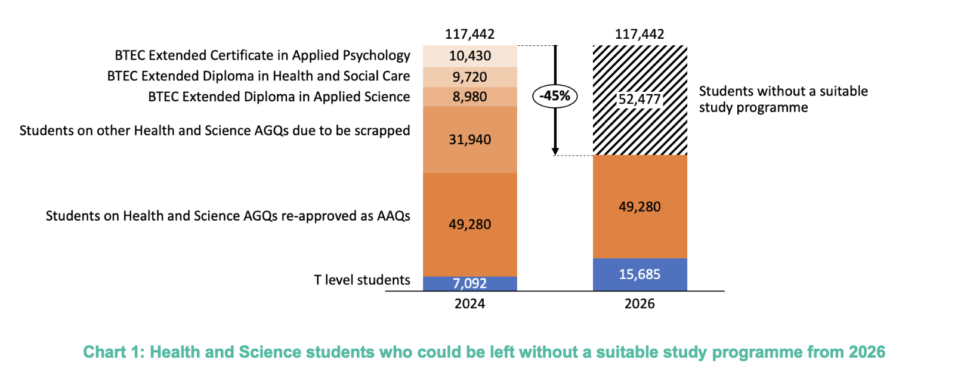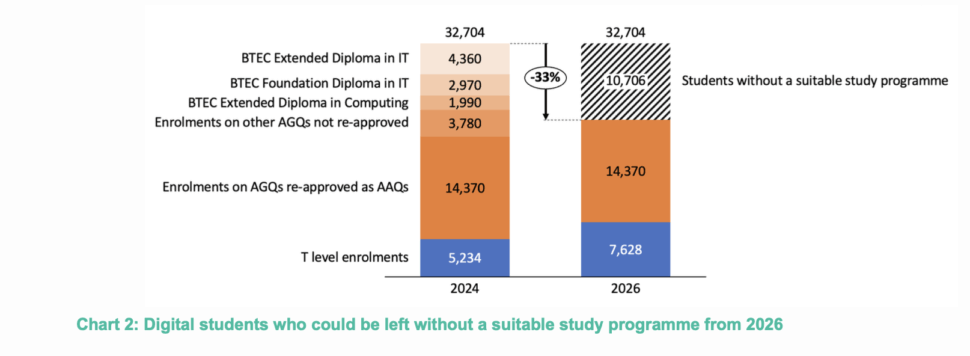Tens of thousands of youngsters are at risk of falling through a “qualifications gap” in key areas of the economy because of the government’s plan to scrap BTECs, campaigners estimate.
In December 2024, the Department for Education announced a future blanket ban on all diploma and extended diploma size applied general qualifications (AGQs) – courses equivalent to two and three A-levels respectively – in T Level subjects.
Ministers’ aim is to “direct” students away from AGQs to T Levels – new courses dubbed to be the technical equivalent to A-levels.
It means popular AGQs like BTECs in subjects such as health and social care, applied science and IT will be scrapped in 2026, with “highly regarded” AGQs in business and engineering due to follow in 2027.
The government’s “optimistic” forecast is that just 91,200 students will be studying a T Level in 2027 – up from 41,589 learners in 2025. There are currently 277,380 students studying an AGQ.
New analysis by the Protect Student Choice campaign indicates that the bonfire of AGQs will lead to 52,000 fewer young people studying health and science courses each year, a reduction of 45 per cent.
And there will be 11,000 fewer young people studying digital courses each year, a fall of 33 per cent, according to the report.
Government priority areas to be hit
Life sciences and digital and technologies are two of the eight priority sectors identified in the government’s industrial strategy.
Campaigners said that reducing the numbers of students studying these subjects will “hamper plans to upskill the workforce and act as a barrier to achieving the government’s key mission to kickstart economic growth”.
Campaigners have urged the independent curriculum and assessment review (CAR) chaired by Professor Becky Francis to recommend that the government “reverses the ban on AGQ diplomas and extended diplomas in T Level subjects when it publishes its final report in the autumn”.
It comes after a briefing from Skills England, seen by FE Week, warned that while most colleges and schools know about the government’s level 3 reforms, there is “significant uncertainty about how they work in practice”. The note, which followed a survey of 122 providers in May, added: “Awareness does not equate to confidence.”
Labour MP Gareth Snell, who also chairs the all-party parliamentary group on sixth form education, said: “Sixth forms and colleges up and down the country know the vital role that AGQs play in helping students to progress to higher education or skilled employment.
“Limiting the choice of qualification in certain subjects to T Levels will leave some young people without a suitable pathway at the age of 16, and some employers without the skilled workforce they need.”
December’s stay of execution
In 2021, the Conservative government announced plans to scrap funding for AGQs and shift to a two-pillar system where most young people would pursue A-levels and T Levels.
The new Labour government conducted a limited review of the level 3 reforms after coming into power in 2024. As a result, the plan to axe AGQs in subjects such as applied science, health and social care and IT was paused for 12 months.
But last December, the government also announced a blanket ban on all diploma and extended diploma-sized AGQs – 720 hours or more – in T Level subjects.
Guidance published in February 2025 confirmed that “large qualifications in T Level routes…will have funding removed” and last month skills minister Jacqui Smith (pictured) emphasised that the government “remains committed to T Levels being the best large qualification in routes where they are available”.
The Protect Student Choice campaign looked at two subjects where it had sufficient data to forecast T Level student numbers and compare it to enrolments on AGQs set to be scrapped.
Using static overall student numbers for “simplicity”, the analysis suggests there will be 52,477 health and science students without a “suitable” study programme in 2026 due to the slow projected growth of T Levels.
Professor Martin Green, chief executive of Care England, said health and social care AGQs are “highly valued as a source of introducing younger people to a career in social care”.
“Scrapping these qualifications would close off a well-established pathway to entering the profession and exacerbate the workforce crisis in the care sector for a younger population we are keen to promote access to,” he added.

By repeating the same analysis for IT, computing, and digital, the campaign found government’s plans could result in almost 11,000 fewer young people studying these subjects each year.
Nimmi Patel, head of skills, talent, and diversity at techUK, the UK’s technology trade association, said: “With over 10,000 fewer young people set to study IT and digital subjects each year, the pipeline of future tech talent is under threat. At a time when the government is prioritising growth through innovation, it’s vital that pathways like BTECs are retained to ensure a diverse and skilled workforce for the UK’s digital economy.”

The research also indicated that just 71,000 of the 277,380 students currently studying an AGQ are enrolled on those that the government has agreed not to scrap – which are all equivalent to one A-level or smaller and will be known as alternative academic qualifications (AAQs) in the future.
The rest – more than 200,000 students – are studying AGQs that are either being scrapped or have an “uncertain future”.
The fate of the 134 AGQs
Protect Student Choice’s focus is on the 134 recently reformed AGQs currently available to young people, which are included in the DfE’s performance league tables.
The government is reviewing these in two cycles. Of the 55 in cycle one – subjects like applied science, IT, and health and social care that overlap with the first few waves of T Levels – 17 have been reapproved as AAQs. However, 20 were scrapped in 2025 and the remaining 18 are due to be scrapped over the next two years.
There are 79 AGQs in cycle two – subjects that clash with T Levels rolled out in later years. Campaigners said know that popular diplomas and extended diplomas in, for example, business will be scrapped as there is a T Level in this subject, but there is “uncertainty about the fate” of the one A-level equivalent qualification.
“Many” of these AGQs, such as criminology and applied law, have a “very high number of enrolments” yet a decision will not be made on their future until the curriculum and assessment review report is published, today’s report said.
Another quals review possible
Colleges and schools have been told that the future of these qualifications will be set out when Francis’ CAR reports in the autumn.
Campaigners said it seems “unlikely” that the review will make specific recommendations about individual AGQs by size and subject, which “raises the possibility of yet another qualifications review”.
“This uncertainty is making it difficult for colleges and schools to plan their future curriculum, recruit and train the right staff, or to provide appropriate information, advice and guidance to younger pupils,” campaigners added.
A DfE spokesperson said: “T Levels will be at the forefront of our technical education offer. Alongside them, newly reformed qualifications will become available for delivery at level 3 at the start of the next academic year. These are high-quality, aligned to occupational standards in technical routes and offer learners clear routes to higher education or skilled employment.
“The department’s position on further plans for reform to level 3 qualifications will be set out soon, informed by the independent CAR.”
















Chart 1 & 2 tell a story if you have an eye for detail.
Chart 1 showing ‘student’ counts in Health & Science.
Chart 2 shows ‘enrolment’ counts in IT.
Students and enrolments are not inter-changeable stats when you are comparing qualification / programmes of different lengths.
A classic example of one of the pitfalls of trying to ‘simplify’ complex stats.
(and that’s before you start thinking about the achievement rates or outcomes of the various quals / programmes)
The titles to both charts refer to ‘students’. When looking at a single subject area, student and enrolment numbers are essentially the same, given performance table discounting. It would be an odd college that put the same student on a single in IT and a double in computing.
Care to remind us of T level achievement rates?
A critique on the methodology of a report defending AGQ’s, shouldn’t be assumed as being in support of T levels. Just as this post, shouldn’t be assumed to be in support of AGQ’s!
T level achievement rates are almost certainly lower and the available data on outcomes won’t yet have anything meaningful in it because of the immaturity of T Levels as a programme.
Due to the poor take up in T-Level and the requirement within the T-Level for employer involvement, 1000’s of potential students will be left without a choice! If this is a bid to push students to the T-Levels, perhaps think about getting employers on board first (they are the only mandatory element!).
I am all for making the quals landscape easier to negotiate however having so few options for school leavers borders on insanity. Colleges are adept at delivering the BTEC and the vast majority with excellent results……if it’s not broken don’t try to fix it!
I have a couple of thoughts on this. First I have taught BTEC and T level and whilst it is certainly easier to get a high grade in a BTEC, the students prefer the extra learning they get on the T level. A large proportion of the time on an AGQ is spent churning out assignment after assignment.
Secondly, whilst I don’t want to devalue the effort that learners put into an AGQ, we do have a large number of learners with a lower Alps score getting higher grades than one might expect.
Nonetheless, a solution must be found for learners who do not meet the entry requirements for T Level and for providers who cannot find the number of placements required.
My first point should be solved by the Foundation T Level, but that is not yet a fully developed qualification pathway. In my opinion, the Foundation year should allow learners to spread out the full T level over 3 years. Learners could take the core papers in year one the ESP and year two and the occupational specialism in year 3.
I do not have a solution to the placements issue.